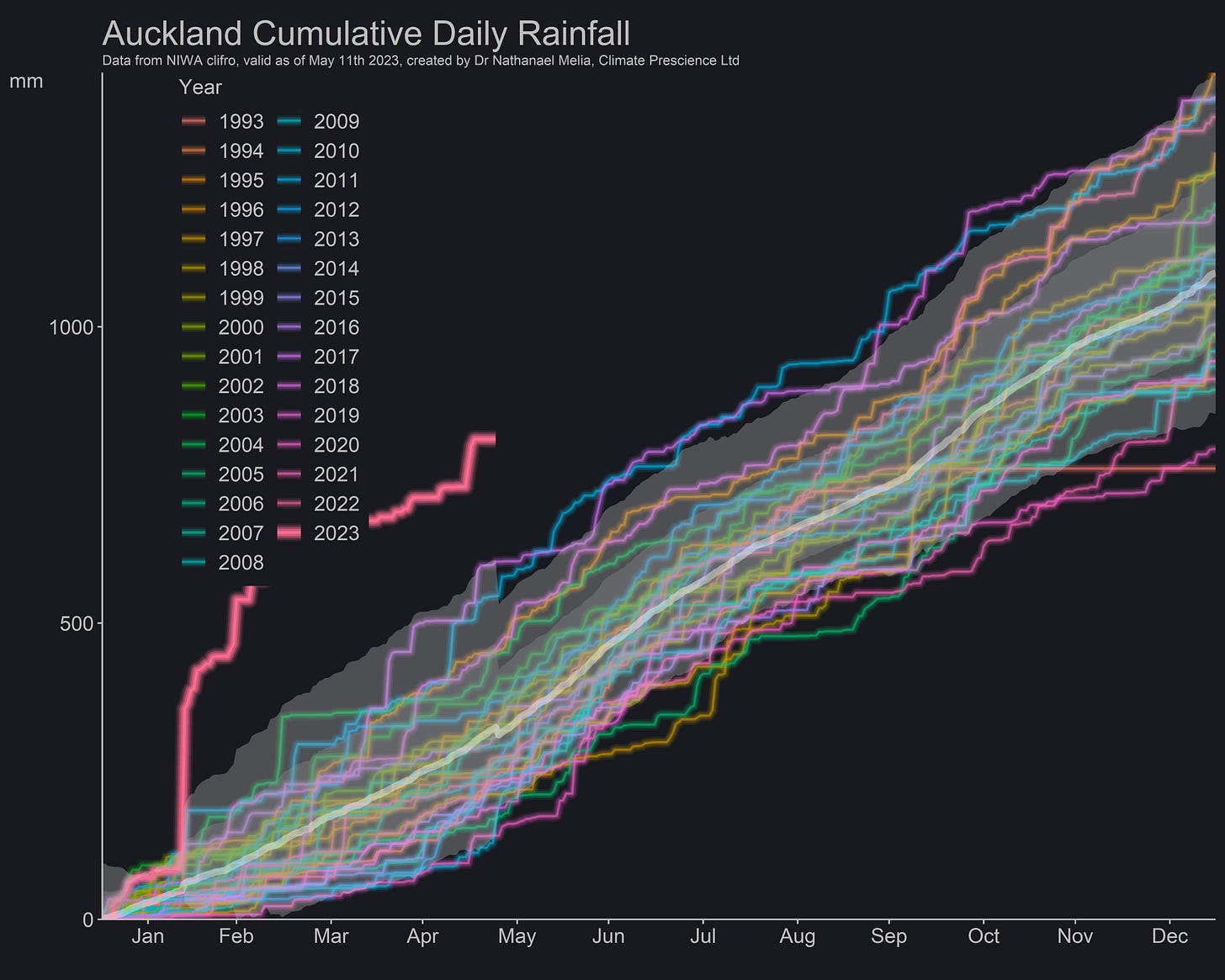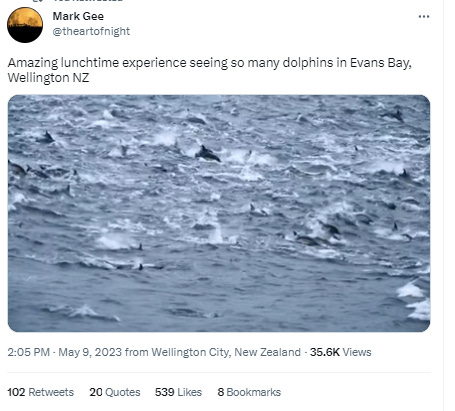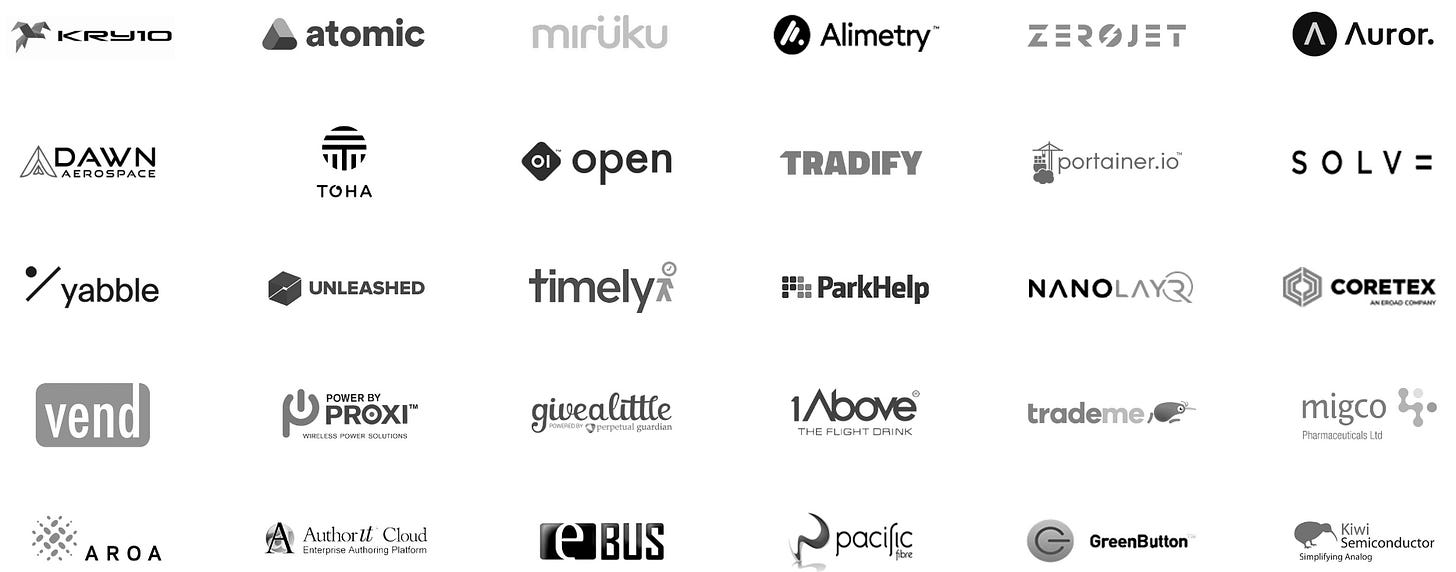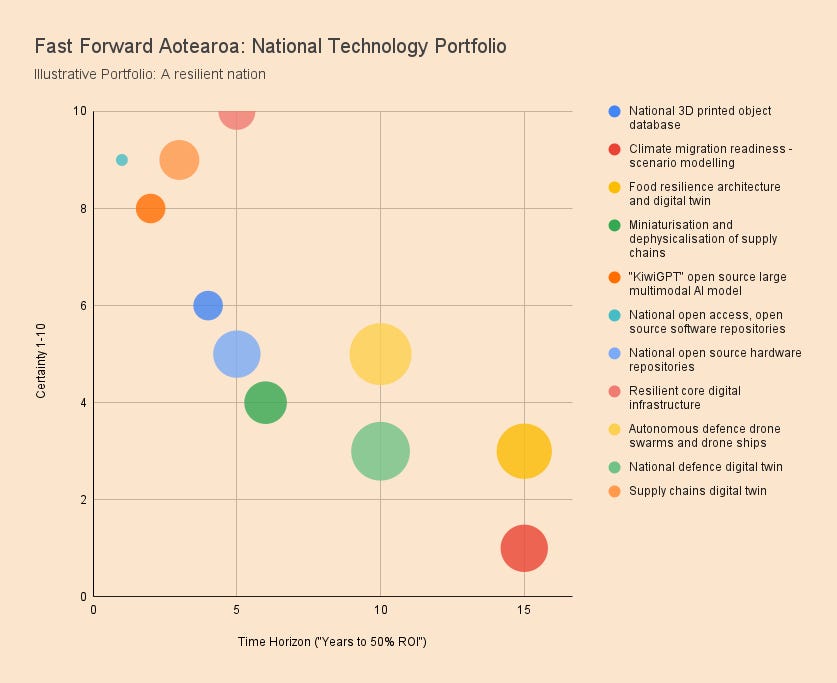⏩Fast Forward Aotearoa #39: Portfolio construction cont'd...🫧government-as-API🌐 clenched-shut banking🔐🏦on yer bike, Mr Mayor🚴👴have an EPIC Techweek🛸Movac growth fund 6🫘
Cycling is a disaster for the economy
Kia ora,
Welcome to this week’s ⏩Fast Forward Aotearoa, thinking about emerging technology and the unfolding future of my corner of the world, Aotearoa New Zealand. Thanks for reading!
(TIP: If you want to keep receiving the weekly Wednesday Memia emerging tech newsletter but prefer not receive these Aotearoa-focused posts you can manage your subscription preferences here.)
Aotearoa roundup
A quick roundup of a few threads I’ve been seeding / tracking recently… and then continuing on with the book.
In brief:
Wet, wet, wet:

Source: @nathanielMelia Are New Zealand's marine heatwaves a warning to the world? As seas around Aotearoa heat at an unparalleled rate, scientists are starting to understand what it might mean for marine ecosystems (The Guardian)
The Prime Minister’s Chief Science Advisor is leading a new project looking into Artificial Intelligence, with a particular focus on healthcare delivery. The draft Terms of Reference can be found here. They are seeking participants, reach out at info@pmcsa.ac.nz.
Meanwhile, Te Whatu Ora blocked access to ChatGPT (but not Bing??) while the “AI and Algorithm Expert Advisory Group for health” works to “understand how to best use these platforms safely”. Here’s a quick hint…
🌐Government-as-API
On which topic…a perennial thought experiment of mine…
Last week I posted to Bernard Hickey’s Kākā subscriber chat in a thread on the perennial topic of Debt-to-GDP ratios:
“An alternative perspective: the AoNZ public sector as it is currently structured is inefficient and unscalable and becoming more so. They are stuggling to keep up with technology change and digitise services. Pumping more money into its current form will not achieve desired outcomes and is effectively just pouring future generations' wealth down a hole.
Personally I think you could remodel most of AoNZ government bureaucracy as a software API which would do the same or better job, cost a fraction of the current overhead to run and free up the people inside it up to do more productive, creative work.
We should be seeing the dividends from exponential technology to do far more with far less, not doubling down on last century's public sector bloatware.”
After sleeping on this overnight, I sat down for 10 minutes and typed in the following into ChatGPT:
“I want to provide an API for all New Zealand government services. Write me the full API reference summary documentation.”
What came back amazed *even me* in its simplicity... read more below. Starter for 10, GDCO…!
🔐🏦Clenched-shut banking
Sharing a recent personal experience with new “Open” banking APIs in Aotearoa…
I am a longstanding customer of Pocketsmith1 for personal and family budgeting and finance management. It’s a very effective tool, if slightly complex... takes a fair amount of effort to get it humming.
Recently I signed up to use the new open banking feeds provided by open banking provider Akahu… (a competitor to international provider Yodlee who I’ve used to date).
Although the setup process worked first time (despite some misleading error messages from my bank Westpac), I was put out by the fact that I had to enter my internet banking credentials into an Akahu web page, not Westpac itself. (This is terrible security practice and I'm shocked that there is still no standards-based single sign on (SSO) mechanism to enable authentication... highly disappointing in 2023!)
In following up with Westpac customer services, I received this response:
“In the future, when we have open banking and good quality APIs, this will likely be a different story. Until then, customers that use these types of services are breaking their terms and conditions with Westpac, as they are providing their login credentials to a third party.“
(Note: Westpac NZ are actually an investor in Akahu!!!)🤦You couldn’t make this up …
No worries, I’ll just move to a competitor bank which supports open banking APIs… oh, hang on… there aren’t any…
The unvarnished truth:
It will take significant resources for stodgy AoNZ bank systems and internal IT shops to deliver open banking APIs, and those resources won’t be marshalled without a looming regulatory deadline.
(Although surely it would be simple enough for Akahu and other open banking software providers to be subcontracted to host a “https://akahu.westpac.co.nz” subdomain and allow single sign on using that for their services? The domain certificate is important but the implementation underneath it can be hidden…)
Most banking boards and execs see open banking as a threat to their comfortable walled gardens, so they're going to wait as long as they can until they're forced into action. (See prime example from the end of last year: BNZ stalls fintech Akahu at last mile of API deal.)
(A timely reminder: AoNZ banks made upwards of NZ$7 billion in profits last year, among the highest in the world.)
Bernard noted on Saturday that that the PM and Finance Minister are trailing a banking review as part of the Labour election manifesto, including:
“forcing banks to allow FinTech competitor-access to customer data feeds through Application Programming Interfaces (APIs) to their computer back-ends.”
Can’t come soon enough. My 2c: pressure to open up APIs needs to be applied REALLY hard with big penalties - there’s a substandard service being provided currently with the banks able to lock customers into stodgy bundled services with zero competitive pressure to innovate. (Again, Aotearoa is *TOO SMALL* to attract the kinds of digital-first challenger banks we’ve seen in larger economies… I wonder out loud whether an investment in Kiwibank to become the “Universal Basic Banking” provider for all residents and then giving it a mandate to drive technological innovation through the sector…)
🚴👴On yer bike, Mr Mayor
Time for a bit of local politics…(sorry). I couldn’t help getting fired up by yesterday’s headline in Te Matatika/The Press:
“Christchurch mayor Phil Mauger says council transport staff are “running amok” and need to be “reined in” after they approved a cycleway under the guise of temporary traffic management.“
FFS. This is the mayor of the same city council which declared a climate emergency back in 2019.2 Complete dog whistle to future-shocked suburban boomers and outskirts-dwelling wankpanzer owners, most of whom will only drive into town twice a year, if that.
(I actually went past the new Rolleston Ave / Park Tce cycle lane in question yesterday and it’s a major improvement to the path and the road, making the area safer and more amenable for cyclists AND pedestrians. And I have an even better idea: make ALL of Rolleston Ave completely car-free and open it up with more street furniture for hospitality / street market!).
Compare and contrast European cities:
Local politicians in Copenhagen last week agreeing on a resolution to pave the way to banning ALL cars with combustion engines from the city by 2030.
In Paris, during the pandemic the city built 51 km of temporary, protected bike lanes and reduced the speed limit on many city streets to under 30kph. The number of cycling trips spiked 60 percent compared to 2019. The French capital under Mayor Anne Hidalgo is now targeting filling in the rest of the gaps to become a 100 percent cycling city. This is what it looks like now:
On yer bike, Mr Mayor!
(Which reminds me… Cycling is a disaster for the economy).
"A cyclist is a disaster for the country's economy: they do not buy cars and do not borrow money to buy. They do not pay for insurance policies. They do not buy fuel, do not pay for the necessary maintenance and repairs. They do not use paid parking. They do not cause serious accidents. They do not require multi-lane highways. They do not get fat.
Healthy people are neither needed nor useful for the economy. They don't buy medicine. They do not go to hospitals or doctors. Nothing is added to the country's GDP (gross domestic product).
On the contrary, every new McDonald's restaurant creates at least 30 jobs: 10 cardiologists, 10 dentists, 10 dietary experts and nutritionists, and obviously, people who work at the restaurant itself."
P.S. Walking is even worse. Pedestrians don't even buy bicycles.
🛸Have an EPIC Techweek
As covered in last week’s issue, it’s now Techweek until Friday May 19th… check out the events online all around Aotearoa… and maybe see you in person at EPIC, the hub for #Ōtautahi:
Rollcall
🫘Movac Growth Fund 6
A big shout out to partners Phil McCaw, Mark Vivian, David Beard and the whole team at Aotearoa venture capital firm Movac for successfully raising NZ$202M for their Growth Fund 6 (the largest VC fundraise in the country to date by my reckoning):
“Our key institutional investors are NZ Super, Generate KiwiSaver, Fisher Funds and Government Superannuation Fund. They'll be investing alongside a number of iwi, community trusts, family offices and individual investors…“
Movac is one of Aotearoa’s pioneering national success stories building depth in the domestic VC ecosystem — in particular it’s awesome to see more institutional investors and Kiwisaver funds coming along for the ride.
Not all of the country’s economic inertia will be solved with private VC — but funds like Movac go a long way towards supporting the international expansion of home-grown technology firms in particular - their portfolio reads like a “who’s who” of Aotearoa’s tech export sector:
Congratulations on the raise, Movac team!
Kōhatu huna
A large pod of dolphins swam by Evans Bay last week, nicely captured by Mark Gee. Nature still in one piece around our shores.

🫧Portfolio construction continued…
Continuing to enumerate my “starter for 100” national technology investment strategy. Two more illustrative mission-oriented technology investment portfolios below.
Mission: A Resilient Nation
A set of investments to improve situational awareness and address vulnerabilities in areas such as national defence, supply chain resilience and technology self-sufficiency. (Note: missing from the list below is a major prerequisite: re-shoring sufficient manufacturing capability: see Mission: A Productive Economy next).
Keep reading with a 7-day free trial
Subscribe to Memia to keep reading this post and get 7 days of free access to the full post archives.








